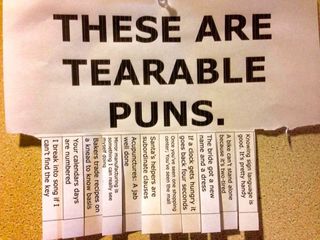Earlier this year, I was commissioned to investigate the linguistics of punning and humor by a major online fast food vendor. The unexpected source of this commission derived from TV ads, that were being aired in the UK on behalf of JUST EAT. The TV ads, which featured funny takes on famous tunes like Bonnie Tyler’s 1980 power ballad ‘I Need a Hero’ – re-worked as ‘I Need a Balti ‘– have helped the company hit 200m sales. But as an unexpected bonus, they have also sparked a competition to see who can come up with their own funniest titles. The company has received hundreds of puns via social media and has set up its own hashtag. They received so many that they started a competition giving vouchers to the most innovative entries. Here are the top ten:
1. Take me down to the jumbo prawn city, where the veg is green and the grills are sticky – Guns n Roses
2. Is it too late now to say balti? Coz I'm missing more than your curry – Justin Bieber
3. I like pork chops and I cannot lie, even tastier with some fries – SirMixalot
4. We built this chippy, we built this chippy with rock and roe – Starship
5. A little bit of vindaloo in my life. a little bit of naan bread on the side – Mambo
6. Getting chicken with it! – Will Smith
7. Like a gherkin... Tried for the very first time – Madonna
8. I predict a fry up; I predict a fry up – Kaiser Chiefs
9. Hello ... Is it meat you're looking for – Lionel Richie
10. I can stuff my face when I'm with you, yeah I love it – The Weeknd
In response, JUST EAT asked me to analyze what makes a successful musical pun. And I even got to spend a day doing radio interviews with the BAFTA award-winning British hiphop artist Akala, who, amongst other things, is the founder of the HipHop Shakespeare company.
What are puns?
Punning, or wordplay, often has a bad rap for being the lowest form of humor; this is not helped by the groan-inducing jokes by your tipsy uncle, at the family BBQ, incessantly smirking when referring to the nice ‘buns’, as the bread rolls are sliced—nudge nudge, wink wink. But puns are incredibly complex, requiring your brain to perform exquisite gymnastics in putting together carefully choreographed aspects of word sounds and meanings in novel ways. There are many different types of puns, but the essential ingredient is ambiguity—or two meanings rolled into one—which leads to a humorous effect.
Sometimes the meaning arises because the word itself is ambiguous, as in the word ‘bun’ with two meanings. And sometimes the ambiguity arises because two distinct semantic fields are being brought together, leading to a clash; and this clash leads to humorous effects, as in the case of the JUST EAT puns.
Punning allows multiple meanings to be packed into the fewest words possible, providing often startling effects, giving rise to humor. Skilled punners are admired, especially given the often bawdy and irreverent themes that punning lends itself to, such as double entendres. Examples abound throughout the history of English. In The Canterbury Tales, for instance, Chaucer used the middle English word queynte, to humorous effect—the word described the domestic duties performed by women, and was also a slang term for female genitalia. And around two hundred years later, in Romeo and Juliet, Shakespeare has Mercutio describe midday in the following terms “the bawdy hand of the dial is now on the prick of noon”. And there is even an international punning competition, the O’ Henry pun-off world championship, now in its 39th year.
History of puns
Punning has a long history, with recorded cases going as far back as the 7th century BC. The ancient Roman playwright Plautus, of the old Latin period, made extensive use of puns in his comedies. Punning has been the subject of serious academic study, from the middle ages onwards, and was known by the Greek term paronomasia.
The earliest recorded usage of the word pun, in English is probably around 1644. One theory is that the term derived from the name of a character in a popular 1641 play, The Guardian by Abraham Cowley. In the play, a protagonist, Mr. Puny is noted for his attempts at word-play. And by the early 18th century, the term ‘pun’ was widely used in English. While many other languages exhibit punning, English seems to especially lend itself to it. One reason is that our “magnificent bastard tongue”, as one commentator dubs English, has borrowed words extensively from other languages, providing a rich vocabulary source for punning. Another is that English words often exhibit multiple meanings—each English word exhibiting 2.5 distinct meanings on average, by one estimate. These both provide a rich basis for punning.
Is it too late to say Balti?
The most successful JUST EAT puns meet three criteria. As they are based on pop songs, the puns must have the same number of syllables, or beats, as the original line. Secondly, they must make sense: the words that replace the originals must fit with the other elements in the sentence. In the pun, ‘Is it too late to say Balti, cause I’m missing more than your curry?’ the words ‘sorry’ and ‘body’ from the Justin Bieber song have been replaced by ‘Balti’ and ‘curry’. But the new line makes perfect sense in its own terms. And third, the humorous effect arises from a clash from two quite different worlds: romantic love vs. take-away food.
The best puns are the most striking and surprising: the domain of young, romantic love, as conveyed by the saccharine words of Justin Bieber have been transformed into an idyll about someone’s haute cuisine. The well-known pop lyrics have been rendered as a paen to someone’s balti-making skills. The lyrics evoke the Justin Bieber song while conveying food imagery. And this clash, between the two, makes the whole funny. The best puns are precisely those that work on all three levels, creating a seamless integration of the romance and drug-fuelled pop themes—Take me down to the Paradise City, where the grass is green and the girls are pretty—with the lush flavors of a mouth-watering JUST EAT delivery—Take me down to the Jumbo Prawn City, where the veg is green and the grills are pretty.
Humor is good for us
Not only are puns and other forms of humor entertaining, they are good for us too. Human begin responding to humor around four months of age, by laughing, and children laugh around 300 times a day on average, while adults laugh around 17 times. Laughter makes us more attractive to friends, colleagues and members of the opposite sex and carries many health benefits: better brain function, which enables more effective learning, lower blood pressure, and a healthier heart.
Humor is something that we create in our minds, by blending bits of information in new ways, providing startling or unexpected effects. These effects, which are often surprising, such as Knock Knock jokes, are funny precisely because they are unexpected. But the humor lies not in the joke’s telling, but in the way in which our mind’s create the effect, by combining cues provided in the build-up to the punchline in order to ‘get’ the punchline. And the funnier the joke, often, the more unexpected its effect is.
Why the Brits love puns
British humor often takes the form of poking fun at the absurdity of everyday life. It is also marked by being self-deprecating. Innuendo, irony, intellectual jokes and puns are ideally suited to this. The JUST EAT puns are exemplary examples, as they play on, and send up, the ideals of beauty and eroticism associated with romantic love, as glorified in the pop song genre, with the more common-place need to eat. And by integrating the quotidian—ordering a take-away curry, for instance—with a romantic ideal that our pop stars croon over, the everyday banality of ordering food is elevated in a way that glorifies the otherwise unremarkable act of ordering a takeaway. And this mismatch appeals to the understated, and often down-to-earth nature of the British sense of humor.





